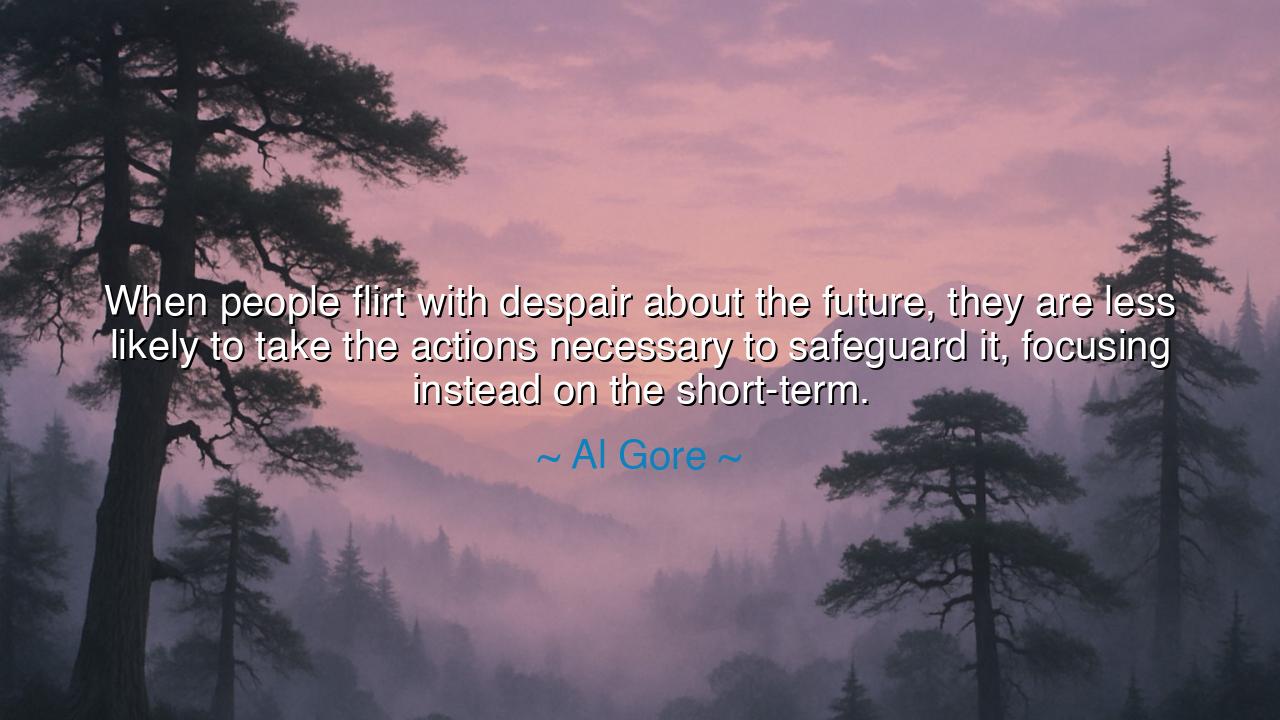
When people flirt with despair about the future, they are less
When people flirt with despair about the future, they are less likely to take the actions necessary to safeguard it, focusing instead on the short-term.






In the times of ancient sages, there were those who spoke of the future as an unseen river, flowing steadily toward the unknown, carrying all of humanity in its current. These wise ones knew that the strength of a civilization lay not in its ability to conquer the present, but in its foresight, in its ability to protect and preserve what would come after. It was said that to be so consumed by the uncertainty of the future that one faltered in taking action was to doom oneself to despair. And yet, many in their time—just as we do today—found themselves flirting with the specter of despair about what tomorrow might bring, and in doing so, failed to take the steps necessary to ensure a brighter horizon.
Al Gore, a modern sage, spoke wisely when he said, "When people flirt with despair about the future, they are less likely to take the actions necessary to safeguard it, focusing instead on the short-term." These words speak to the heart of human nature. In times of trouble, it is easy to become consumed by fear, to believe that the world is beyond saving, and that our actions, however noble, will not change the course of things. It is in such times that we are most vulnerable to the temptation of focusing only on immediate gratification—to seek comfort in the present, even if that means sacrificing the long-term health of our world, our societies, and our children.
Think of the ancient civilizations—Rome, Greece, and even the great empires of the East—whose downfall came not from a single mighty blow but from the gradual erosion of their long-term vision. Rome, for example, in its time of greatest glory, began to focus on the short-term gains of power, wealth, and expansion, neglecting the foundations that had made it great: justice, honor, and civic duty. The rulers and citizens alike turned their gaze inward, consumed by the present, and in doing so, they sowed the seeds of their own destruction. They flirted with despair about the future—too engrossed in their present battles to prepare for what was to come.
In our time, this truth is no less evident. The challenges we face—whether climate change, economic instability, or the erosion of social structures—are not problems that can be solved with quick fixes or momentary solutions. Yet, how often do we find ourselves entranced by the immediacy of the moment, focusing on what is easy and quick rather than what is enduring and necessary? Despair, as Gore points out, clouds our vision, and when we succumb to it, we neglect the very actions that could safeguard the future.
Consider, then, the example of Nelson Mandela, a man whose vision was not clouded by the despair of the present. When South Africa was gripped by apartheid, and the future of the nation seemed bleak, Mandela did not allow himself to fall into despair. He focused on the long-term goal of unity and freedom, even when it seemed that such a future was unreachable. He took actions—difficult, painful actions—toward reconciliation and equality, knowing that the seeds of a just society could not be planted in haste. His vision extended beyond the moment, and he urged his people to do the same, to look past the immediate struggles and work toward a future that would be far greater than any of the short-term victories they might achieve.
Thus, the lesson to be learned from Gore’s words is clear: do not flirt with despair, for it clouds your judgment and weakens your resolve. When we allow ourselves to become fixated on the fleeting troubles of the present, we lose sight of the larger journey ahead. We must take action—bold action—today to secure the future. We must invest in what matters: the health of the Earth, the strength of our communities, and the well-being of those who will come after us. Like the ancient builders who labored to create enduring monuments, we must look beyond the immediacy of our struggles and build for the future.
The practical lesson is to act with foresight and wisdom. Do not be tempted by the fleeting comforts of the present that come at the expense of a future that is bright with potential. Whether you are a leader, a parent, or a worker in the fields of progress, your responsibility is to act with a long-term vision. This is not a call for endless waiting or for inaction, but a call to steady the course, to build for tomorrow even as we face the challenges of today. Let your actions be guided by the belief that what we create now will shape the world to come, and that, in safeguarding the future, we honor not just ourselves, but all of humanity.






AAdministratorAdministrator
Welcome, honored guests. Please leave a comment, we will respond soon